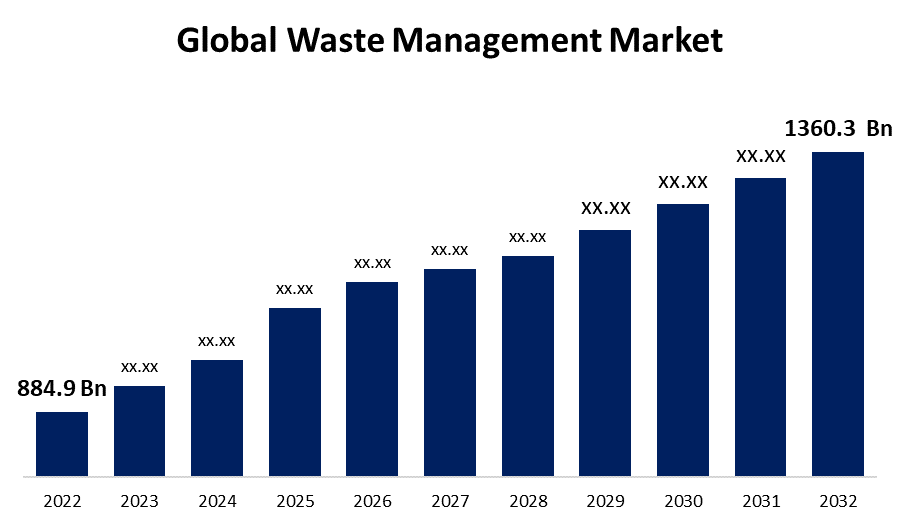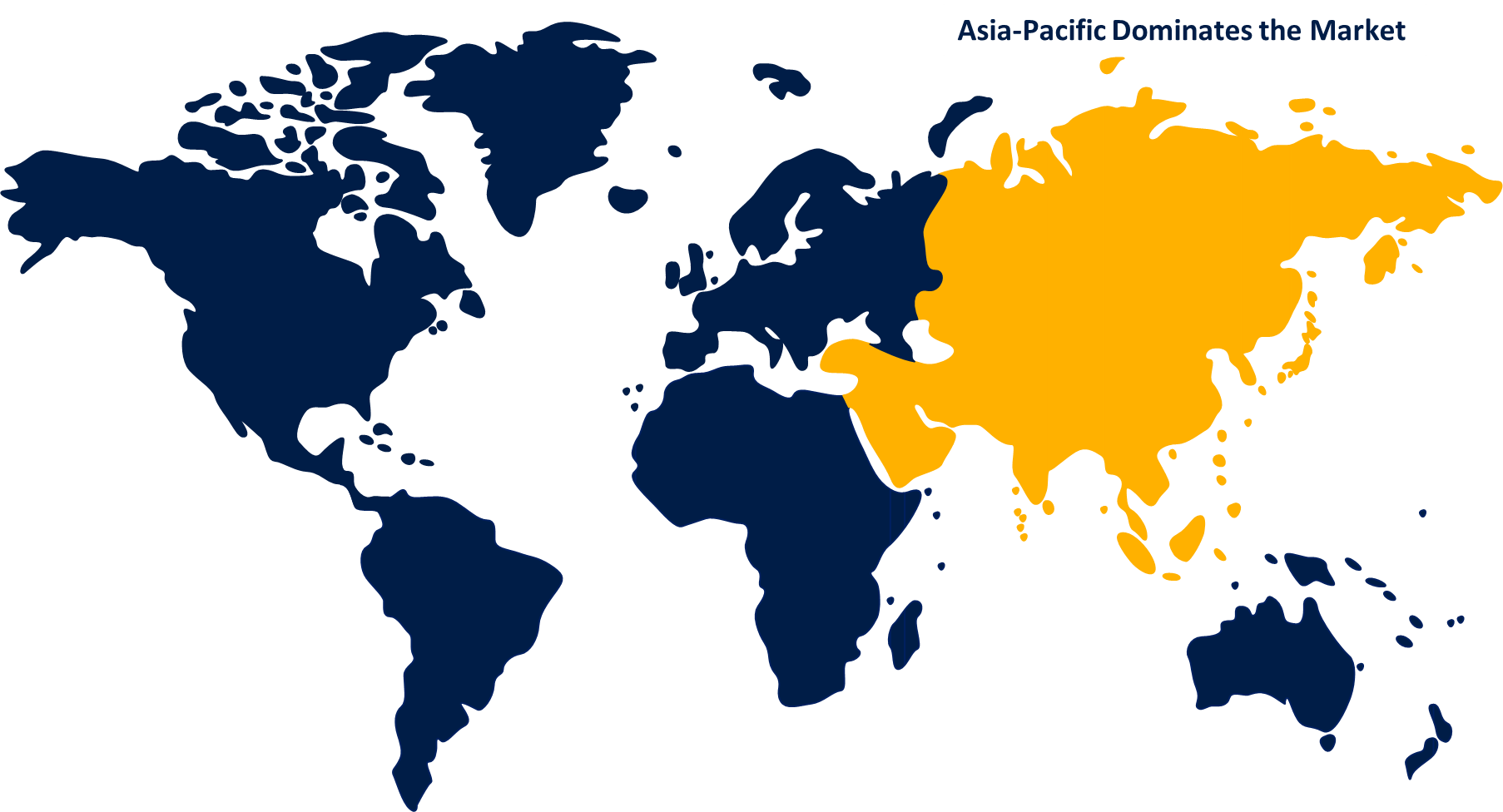Global Waste Management Market Size To Worth USD 1360.3 Billion by 2032 | CAGR) of 6.6%
Category: Chemicals & MaterialsGlobal Waste Management Market Size To Worth USD 1360.3 Billion by 2032
According to a research report published by Spherical Insights & Consulting, the Global Waste Management Market Size to Grow from USD 884.9 Billion in 2022 to USD 1360.3 Billion by 2032, at a Compound Annual Growth Rate (CAGR) of 6.6% during the forecast period.

Get more details on this report -
Browse key industry insights spread across 200 pages with 110 market data tables and figures & charts from the report on the:"Global Waste Management Market Size, Share, and COVID-19 Impact By Type (Municipal Waste, Industrial Waste); By Services (Collection, Disposal); By End-User (Commercial, Industrial, Residential), by Region (North America, Europe, Asia-Pacific, Latin America, Middle East, and Africa), Analysis and Forecast 2022 – 2032.”Get Detailed Report Description Here:https://www.sphericalinsights.com/reports/waste-management-market
Waste management is the systematic collection, transportation, processing, recycling, and disposal of waste materials in an economical and environmentally responsible manner. Effective waste management is essential for maintaining public health, reducing environmental pollution, and conserving resources. The garbage that is generated by buildings, enterprises, industries, and households varies. It comes in a variety of forms, such as liquid waste, hazardous waste, and solid waste. It is crucial to increase awareness of the importance of proper garbage disposal, recycling, and waste reduction in order to encourage responsible waste management practises among the general public and businesses.
COVID 19 Impact
Throughout the pandemic, changes in the composition of the waste were observed. As a result of more people working from home and business closures, there was an increase in residential rubbish, particularly in the form of packing materials and single-use plastics. However, commercial garbage decreased as a result of business closures. The amount of garbage produced fluctuated over time and in different places as a result of lockdowns, restrictions, and variations in COVID-19 conditions. For instance, whereas medical waste increased in areas with more people and healthcare facilities, trash generation reduced in areas subject to strict lockdowns. Recycling operations have temporarily been discontinued or scaled back in numerous locations due to concerns about worker safety and the need to prioritise regular trash collection.
As the world's population continues to Grow and more people move into cities, the amount of waste created significantly increases. Urbanisation tends to produce more waste because of increased consumption and packaging materials. Economic advancement is typically linked to increased industrialization and commercial activity, which generates more industrial and commercial trash. Waste management services are now more necessary as a result. The waste management industry has profited from technological advancements in the sorting, recycling, and disposal of garbage. These developments improve waste management processes and reduce their detrimental effects on the environment. Anaerobic digestion and other waste-to-energy technologies are becoming more and more well-liked as ways to turn trash into electricity while using less landfill area.
As populations and economies Grow, trash generation rates continue to increase, putting increasing burden on waste management infrastructure and resources. The high cost of effective garbage management, which affects the quality and availability of trash services, may cause budgetary problems for municipalities and businesses. To promote recycling and responsible waste disposal practises, ongoing public engagement and education efforts are required. The equipment and infrastructure used for waste management may become outdated, requiring significant investments to upgrade and modernise operations. Because the waste sector contributes to greenhouse gas emissions through procedures like landfilling and rubbish incineration, it is imperative to reduce these emissions through mitigation methods.
Type Insights
Industrial segment holds the largest market share over the forecast period
On the basis of type, the global waste management market is segmented into municipal and industrial. Among these, the industrial segment holds the largest market share over the forecast period. As economies Grow and industrial output rises, so does the generation of industrial trash. Industrial waste generation is on the rise across a number of sectors, including mining, construction, and manufacturing. Programmes for recovering resources and trash are being employed more often across a variety of industries. This includes efforts to lessen waste production, reuse materials, and recycle industrial byproducts. These initiatives could reduce waste management costs while also making money from recycled materials. Technology advancements in industrial waste management have benefited trash sorting, treatment, and recycling techniques. Automation, robotics, and data analytics are being used to optimise trash management operations. As a result of the creation of cutting-edge waste management technology, industries have the ability to reduce waste and extract value.
Services Insights
Disposal segment is dominating the market over the forecast period
Based on the services, the global waste management market is segmented into collection and disposal. Among these, the disposal segment is dominating the market over the forecast period. As the world's population and metropolitan areas continue to rise, waste-to-energy incinerators and other disposal facilities are required to handle the growing amount of waste produced. The ability to convert rubbish into electricity has increased interest in waste-to-energy (WTE) technologies including anaerobic digestion and incineration. Because of the reduction in landfill area requirements and electricity production, WTE facilities are a growing business within the disposal industry. Some disposal facilities are using resource recovery techniques to take valuable components out of waste streams before they are finally disposed of. This increases the value of the garbage and can promote the growth of the disposal business. Initiatives to divert rubbish from landfills through recycling and composting may have an impact on the disposal sector.
End User Insights
Residential segment is witnessing the rapid market growth over the forecast period
On the basis of end user, the global waste management market is segmented into commercial, industrial, and residential. Among these, the residential segment is witnessing the rapid market growth over the forecast period. As the world's population continues to grow, there are more households, which leads to an increase in domestic waste. Increased population densities in cities and towns, where households generate a lot of waste, are a result of urbanisation trends. Services for managing home trash must be efficient. Participation in residential waste reduction programmes and recycling programmes has increased as a result of growing public awareness of recycling and environmental issues. Because of technologically advanced solutions like intelligent waste collection systems and smartphone apps for scheduling pickups, residential trash management services are more effective and efficient.
Regional Insights
Asia Pacific region holds the largest market share over the forecast period

Get more details on this report -
Among all other regions, Asia Pacific regions holds the largest market share over the forecast period. Millions of people relocate to metropolitan areas each year as APAC increasingly urbanises. Due to this trend's increased rubbish creation in urban areas, the infrastructure and services for trash disposal are under pressure. Construction waste, packaging garbage, and electronic waste (e-waste) are a few of the waste categories that are created increasingly regularly in APAC countries as a result of the growing middle class and changing consumer patterns. Wastes from the APAC region include plastic, toxic trash, and organic garbage. To manage this variability, specialised infrastructure and technologies are required. Certain APAC countries are investing in waste-to-energy technologies like anaerobic digestion and incineration to address the issue of rubbish disposal and produce sustainable electricity.
North America is witnessing the fastest market share over the forecast period. North America is home to one of the world's largest waste management marketplaces. It has steadily increased over time as a result of factors including population growth, urbanisation, and industrialization. In the United States, Canada, and Mexico, the population is growing, and urbanisation is pervasive. As a result, a lot of trash is created, mostly in urban areas. Industrial waste, waste from construction and demolition projects, hazardous waste, and electronic waste (e-waste) are all created in North America. The makeup of garbage varies by region.
List of Key Companies
- Advanced Disposable Services
- BIFFA
- Clean Harbors, Inc.
- Covanta Holding Corporation
- Daiseki Co., Ltd.
- FCC Environment
- Hitachi Zosen Corporation
- Repair SE & Co. KG
- Republic Services, Stericycle
- SUEZ
- Urbaser
- Veolia Environment S.A.
- Waste Connections
- Waste Management Inc. Group
Market Segment
This study forecasts revenue at global, regional, and country levels from 2019 to 2032. Spherical Insights has segmented the global Waste Management Market based on the below-mentioned segments:
Waste Management Market, Type Analysis
- Municipal
- Industrial
Waste Management Market, Services Analysis
- Collection
- Disposal
Waste Management Market, End User Analysis
- Commercial
- Industrial
- Residential
Waste Management Market, Regional Analysis
- North America
- US
- Canada
- Mexico
- Europe
- Germany
- Uk
- France
- Italy
- Spain
- Russia
- Rest of Europe
- Asia Pacific
- China
- Japan
- India
- South Korea
- Australia
- Rest of Asia Pacific
- South America
- Brazil
- Argentina
- Rest of South America
- Middle East & Africa
- UAE
- Saudi Arabia
- Qatar
- South Africa
- Rest of Middle East & Africa
About the Spherical Insights & Consulting
Spherical Insights & Consulting is a market research and consulting firm which provides actionable market research study, quantitative forecasting and trends analysis provides forward-looking insight especially designed for decision makers and aids ROI.
Which is catering to different industry such as financial sectors, industrial sectors, government organizations, universities, non-profits and corporations. The company's mission is to work with businesses to achieve business objectives and maintain strategic improvements.
CONTACT US:
For More Information on Your Target Market, Please Contact Us Below:
Phone: +1 303 800 4326 (the U.S.)
Phone: +91 90289 24100 (APAC)
Email: inquiry@sphericalinsights.com, sales@sphericalinsights.com
Contact Us: https://www.sphericalinsights.com/contact-us
Need help to buy this report?